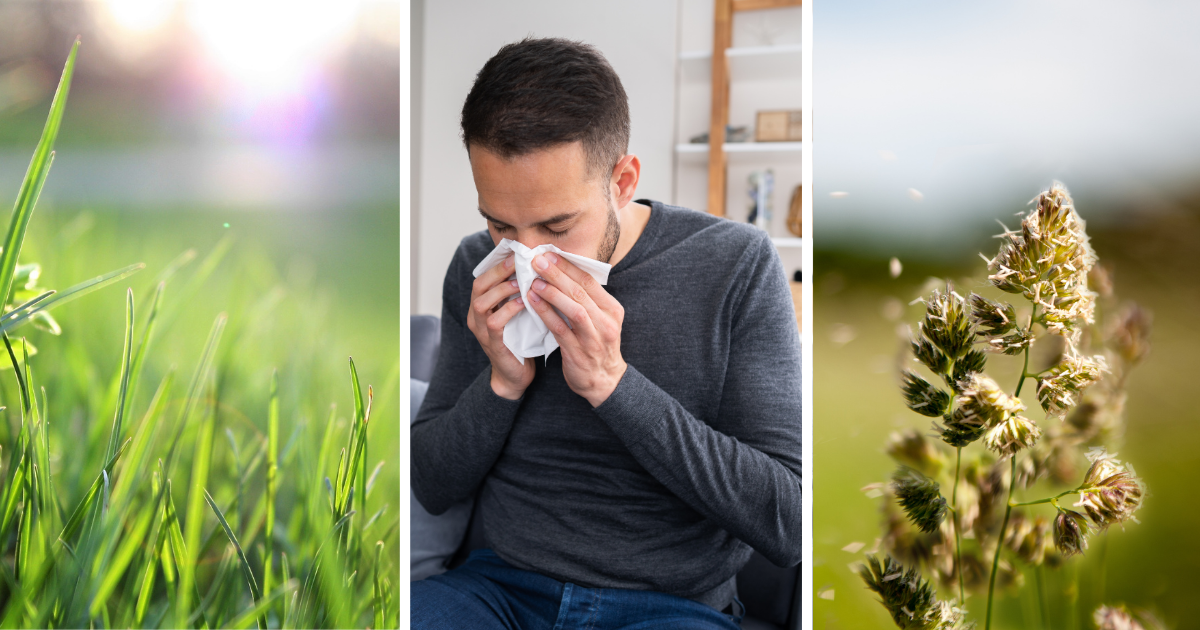Every year, with the first blooms of spring, comes the sneezing, itchy eyes and throat, and coughing. Seasonal allergies are an annual challenge for many of us, but with a few strategic moves, you can reduce the severity. By installing new air filters, using portable air purifiers, and assessing your home and work spaces for allergen-reducing opportunities, you can ease your allergies this season!
What Causes Seasonal Allergies?
We’ve all experienced seasonal allergies or know someone who has, but what exactly are seasonal allergies? According to the American College of Allergy, Asthma and Immunology, “Allergy symptoms occur when your immune system overreacts to something that is harmless to most people but triggers a reaction in anyone sensitive to it. This substance is known as an allergen.” Seasonal allergies, then, include allergens such as tree and grass pollen and mold spores as the most common culprits.
7 Ways to Reduce Seasonal Allergies:
1. Change Your Air Conditioner Filter
First and foremost, replacing your air conditioner filter is a necessary step in reducing seasonal allergies in your home. Not only does the routine replacement of your HVAC filters keep your heating and air conditioning system running at peak efficiency, but it also ensures that the air you are breathing is clean. Here at Discount Filters, you can subscribe to automatic filter deliveries to make consistent AC filter replacement easier.
For peak allergy season air filtering, AIRxX Air Filters take replacing your air conditioner air filter to the next level. Designed for homes that need extra clean air for health reasons, allergies, etc. AIRx air filters go the distance. Their High Flow air filters boast 65% more filtering media for extreme dust holding while also maintaining 2 times the airflow of their competitors. What does this mean? Cleaner air, of course, but also lower energy use and maximum efficiency for your HVAC system. Yes, please!
2. Consider a Higher MERV Rating Air Filter
A higher MERV rating on an air conditioner filter means fewer allergens. So when you are choosing your replacement air filter, consider the MERV rating. The MERV rating helps you find the best air filter for your home. Discount Filters carries the OEM Aprilaire filters and aftermarket alternatives in a variety of MERV ratings, providing excellent filtration at a fraction of the cost. In most cases, these filters should be replaced every six months.
MERV (Minimum Efficiency Reporting Values) rates a filter based on its ability to capture particles in the air. Lower MERV-rated filters allow more particles into your HVAC system. When more dust, dirt, pollen, and allergens make their way into the system, they also blow through the air ducts and into the air inside your home— not what you want during allergy season (or any season, really). When choosing the best air filters for allergies, consider a filter with a higher MERV rating. Filters with MERV 11 rating or higher can help your system filter smaller allergens out of the air so you can breathe easier. For more information about MERV ratings and finding your perfect home air filter, read our article “What MERV Rating Is Right For Me?” to learn more.
3. Purify the Air in Your Car with Cabin Air Filters
Did you know that your car likely has a cabin air filter installed that can be replaced? Similar to your home air filters, car air filters should be routinely replaced to improve the air quality in your car. Make sure your commute air quality is top-notch with cabin air filters from Discount Filters. Find a handy DIY instructional video here.

4. Make Changes in Your Household Cleaning Routine to Reduce Allergens
Take your spring cleaning up a notch by frequently dusting and vacuuming your home to reduce allergens. During allergy season, you may find that your allergies are reduced when you dust, vacuum, and wipe down surfaces more often. Replace your vacuum cleaner filter often to ensure that you’re getting peak performance from your vacuum, as well as the best air filtration. Add fan dust collectors on any ceiling fans to work against dust for just a few dollars.
5. Reduce Carpet and Soft Furnishings
Carpets and soft furnishings gather more dust, dander, and, of course, pollen carried in from the outdoors on our clothes and shoes. Opting for wood or laminate flooring can reduce allergens significantly, but if that isn’t an option for you, low-pile carpet is much preferred to higher-pile carpeting.
6. Practice Smart Pet Hygiene
Pet owners with allergies likely already know the drill with dander, but spring can bring an extra layer (literally) of allergens to manage. Pollen catches a ride on anything that moves, it seems, so pets inadvertently carry in outdoor seasonal allergens from their walks or yard time. Be mindful of letting your animals who spend time outdoors, lounge on your soft furnishings or in your bed during peak allergy season.
7. Try Natural Allergy Remedies
Taking vitamin C or increasing your consumption is a good start. Vitamin C fortifies your body’s immune system and helps combat seasonal allergies. Using steam treatments, local honey, and certain teas can offer at-home allergy relief during peak allergy season. Finding a comfortable way through allergy season usually involves a variety of approaches to find what works best for you!
By considering these tips, you help reduce the severity of your seasonal allergy. It’s all about reviewing your options and what steps you can take to help improve your health in the long run!
Other Frequently Asked Questions
Which month is the worst for allergies?
May is known to be typically the worst for allergies, but this also depends on where you live in the U.S. If you suffer from seasonal allergy, stay prepared by finding an air filter for your home designed to help trap pollen, dust, and other allergens from entering your home!
What makes allergy season worse?
Pollen is known as the main allergy-causing culprit, but human activities such as creating air pollution, using non-native and allergen-producing plants in landscaping, and the increase in temperature change can all contribute to the exacerbation of seasonal allergies.
What happens if you ignore your allergies?
If left untreated, your allergies worsen. This can potentially lead to more severe allergy attacks occurring over time. Frequent or prolonged allergic reactions weaken your immune system, leaving your body vulnerable to bacterial or fungal infections in the sinuses, lings, ears or skin.
Do allergies get worse at night?
Many allergens are more prevalent at night. As an example, dust mites and pet dander can accumulate in bedding and pillows, which can make your symptoms worse when lying down to sleep. Since pollen levels are higher in the morning, this means your symptoms may peak later in the day or at night.

